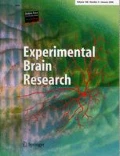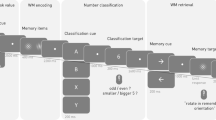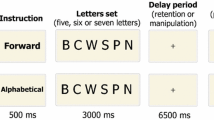Abstract
In a task switching design, we investigated the question whether long-range theta coupling primarily reflects top–down control processes. Switch and stay trials did not differ with respect to memory load or global working memory (WM) demands. The results revealed significantly stronger theta coupling (in a range of 4–7 Hz) between prefrontal and posterior regions during switch as compared to stay trials. Power differences, reflecting more local effects, were largest in the upper alpha band (10–13 Hz) and over posterior brain areas, possibly reflecting long-term memory activation. The conclusion of the present study is that long-range coherent oscillatory activity in the theta band reflects top–down activation rather than global WM functions.



Similar content being viewed by others
References
Allport A, Styles EA, Hsieh S (1994) Shifting intentional set: exploring the dynamic control of task. In: Umilta C, Moscovitch M (eds) Attention and performance XV. MIT, Cambridge, pp 421–452
Baddeley A (1992) Working memory. Science 255:556–559
Barceló F (2003) The Madrid card sorting test (MCST): a task switching paradigm to study executive attention with event-related potentials. Brain Res Protoc 11:27–37
Fingelkurts A, Fingelkurts A, Krause C, Sams M (2002) Probability interrelations between pre-/post-stimulus intervals and ERD/ERS during a memory task. Clin Neurophysiol 113:826–843
Gevins A, Smith ME, McEvoy L, Yu D (1997) High-resolution EEG mapping of cortical activation related to working memory: effects of task difficulty, type of processing, and practice. Cereb Cortex 7:374–385
Gevins A, Smith ME, Leong H, McEvoy L, Whitfield S, Du R, Rush G (1998) Monitoring working memory load during computer-based tasks with EEG pattern recognition methods. Hum Factors 40:79–91
Gevins A, Smith M (2000) Neurophysiological measures of working memory and individual differences in cognitive ability and cognitive style. Cereb Cortex 10:829–839
Gladwin TE, de Jong R (2005) Bursts of occipital theta and alpha amplitude preceding alternation and repetition trials in a task-switching experiment. Biol Psychol 68:309–329
Grunwald M, Weiss T, Krause W, Beyer L, Rost R, Gutberlet I, Gertz H (1999) Power of theta waves in the EEG of human subjects increases during recall of haptic information. Neurosci Lett 260:189–192
Hsieh S, Liu LC (2005) The nature of switch cost: task set configuration or carry-over effect? Cogn Brain Res 22:165–175
Jensen O, Tesche C (2002) Frontal theta activity in humans increases with memory load in a working memory task. Eur J Neurosci 15:1395–1400
Karayanidis F, Coltheart M, Michie PT, Murphy K (2003) Electrophysiological correlates of anticipatory and poststimulus components of task switching. Psychophysiology 40:329–348
Klimesch W (1999) EEG alpha and theta oscillations reflect cognitive and memory performance: a review and analysis. Brain Res Brain Res Rev 29:169–195
Klimesch W, Doppelmayr M, Russegger H, Pachinger T, Schwaiger J (1998) Induced alpha band power changes in the human EEG and attention. Neurosci Lett 244:73–76
Klimesch W, Doppelmayr M, Schwaiger J, Auinger P, Winkler T (1999) ‘Paradoxical’ alpha synchronization in a memory task. Cogn Brain Res 7:493–501
Koch I (2005) Sequential task predictability in task switching. Psychon Bull Rev 12:107–112
Koch I, Prinz W, Allport A (2005) Involuntary retrieval in alphabet-arithmetic tasks: task-mixing and task-switching costs. Psychol Res 69:252–261
Mecklinger A, Kramer AF, Strayer D (1992) Event-related potentials and EEG components in a semantic memory search task. Psychophysiology 29:104–119
Monsell S (2003) Task switching. Trends Cogn Sci 7:134–140
Raghavachari S, Kahana M, Rizzuto D, Caplan J, Kirschen M, Burgeois B, Madsen J, Lisman J (2001) Gating of human theta oscillations by a working memory task. J Neurosci 21:3175–3183
Rappelsberger P (1998) Probability mapping of power and coherence: technical aspects. In: Petsche H, Etlinger SC (eds) EEG and thinking. Verlag der österreichischen Akademie der Wissenschaften, Vienna, pp 63–78
Rogers RD, Monsell S (1995) The cost of the predictable switch between simple cognitive tasks. J Exp Psychol [Gen] 124:207–231
Rushworth MFS, Hadland KA, Paus T, Sipila PK (2001) Role of the human medial frontal cortex in task switching: a combined fMRI and TMS study. J Neurophysiol 87:2577–2592
Rushworth MFS, Passingham RE, Nobre AC (2002) Components of switching intentional set. J Cogn Neurosci 14:1139–1150
Rushworth MFS, Hadland KA, Gaffan D, Passingham RE (2003) The effect of cingulate cortex lesions on task switching and working memory. J Cogn Neurosci 15:338–353
Sarnthein J, Petsche H, Rappelsberger P, Shaw GL, von Stein A (1998) Synchronization between prefrontal and posterior association cortex during human working memory. Proc Natl Acad Sci USA 95:7092–7096
Sauseng P, Klimesch W, Gruber W, Doppelmayr M, Stadler W, Schabus M (2002) The interplay between theta and alpha oscillations in human electroencephalogram reflects the transfer of information between memory systems. Neurosci Lett 324:121–124
Sauseng P, Klimesch W, Doppelmayr M, Hanslmayr S, Schabus M, Gruber W (2004) Theta coupling in the human electroencephalogram during a working memory task. Neurosci Lett 354:123–126
Sauseng P, Klimesch W, Schabus M, Doppelmayr M (2005a) Fronto-parietal coherence in theta and upper alpha reflect central executive functions of working memory. Int J Psychophysiol 57:97–103
Sauseng P, Klimesch W, Doppelmayr M, Pecherstorfer T, Freunberger R, Hanslmayr S (2005b) EEG alpha synchronization and functional coupling during top-down processing in a working memory task. Hum Brain Mapp 26:148–155
Sohn MH, Carlson RA (2000) Effects of repetition and foreknowledge in task-set reconfiguration. J Exp Psychol [Learn Mem Cogn] 26:1445–1460
Sohn MH, Ursu S, Anderson JR, Stenger VA, Carter CS (2000) The role of prefrontal cortex and posterior parietal cortex in task switching. Proc Natl Acad Sci USA 97:13448–13453
Swainson R, Cunnington R, Jackson GM, Rorden C, Peters AM, Morris PG, Jackson SR (2003) Cognitive control mechanisms revealed by ERP and fMRI: Evidence from repeated task-switching. J Cogn Neurosci 15:785–799
Verstraeten E, Gluydts R (2002) Attentional switching-related human EEG alpha oscillations. Neuroreport 13:681–684
Weiss S, Müller HM, Rappelsberger P (2000) Theta synchronisation predicts efficient memory encoding of concrete and abstract nouns. Neuroreport 11:2357–2361
Wylie G, Allport A (2000) Task switching and the measurement of ‘switch costs’. Psychol Res 63:212–233
Wylie GR, Javitt DC, Foxe JJ (2003) Cognitive control processes during an anticipated switch of task. Eur J Neurosci 17:667–672
Acknowledgements
This work was supported by the Austrian Science Fund FWF, Project P16849-B02
Author information
Authors and Affiliations
Corresponding author
Rights and permissions
About this article
Cite this article
Sauseng, P., Klimesch, W., Freunberger, R. et al. Relevance of EEG alpha and theta oscillations during task switching. Exp Brain Res 170, 295–301 (2006). https://doi.org/10.1007/s00221-005-0211-y
Received:
Accepted:
Published:
Issue Date:
DOI: https://doi.org/10.1007/s00221-005-0211-y




